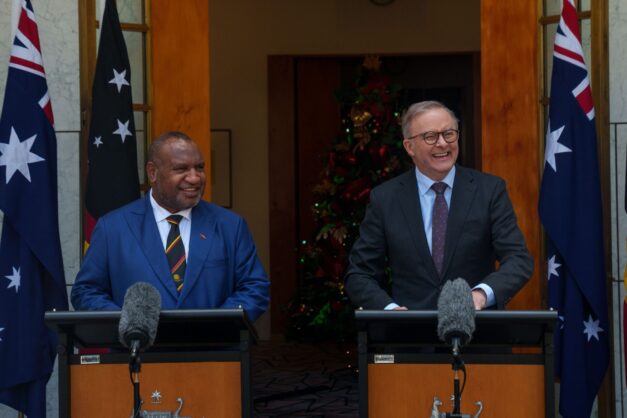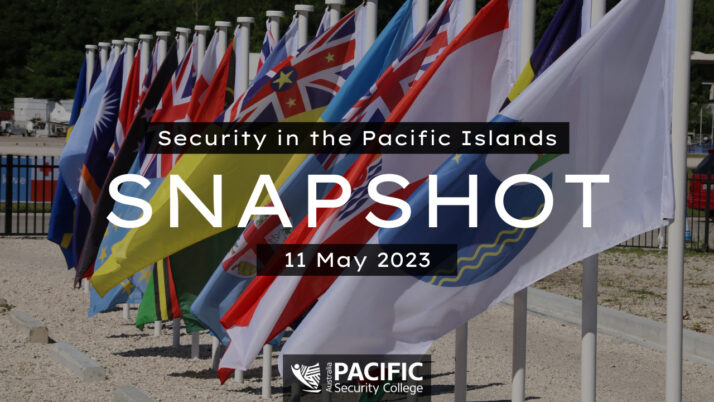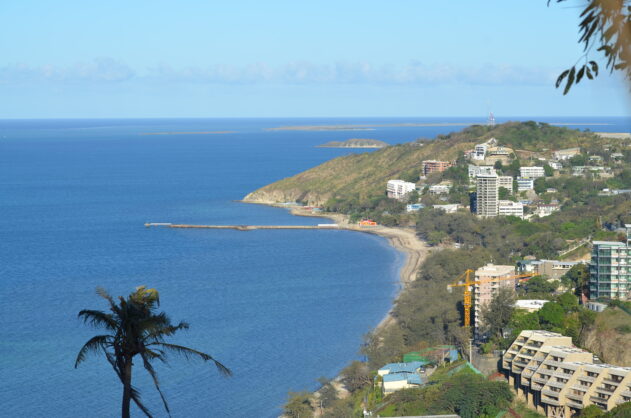The Pacific’s 2020 trendlines
Hugh McClure
Amidst the enormous human security crisis presented by the COVID-19 crisis, access to timely, reliable and relevant information has never been more important, Hugh McClure writes.
Across the Pacific, face-to-face communication has always been central to the way people build relationships and do business. While this hasn’t been possible throughout the COVID-19 pandemic due to the range of restrictions, the availability of trusted information has never been more critical.
In response to the crisis, the Pacific Security College (PSC) launched its weekly COVID-19 Trendlines series in early April to track the policymaking trends across the region. Since the crisis began, the pandemic, and its response, has evolved. Across the year we have published 37 weekly updates tracking these changes, and have been pleased to hear how they have fed into policy discussions.
Reflecting on the year, Chair of the Marshall Islands Nuclear Commission Rhea Moss-Christian said: ‘without the ability to travel and engage with one another face-to-face, we have had to work twice as hard, so having a source of trusted information such as Trendlines has been a great asset.’
Whole-of-nation policy responses have been necessary as the pandemic affected every aspect of policymaking. To an unprecedented extent, the free-flow of information across government has been essential to collective policymaking. Health and security professionals have been required to work hand-in-glove and communicate across departments as they respond to the unique challenge posed by this crisis.
When the tourism industry was put on ice due to border closures, a wave of unemployment swept across the region. Embryonic welfare systems have been called upon like never before, with thousands relying on expansive government stimulus packages and requiring early access to superannuation. As is always the way in times of uncertainty in the Pacific, community-based resilience and the kastom economy have been key.
2020 has shown us that the Pacific island region has strong capabilities. Case numbers in some parts of the region have remained among the lowest globally throughout the year. Effective border management policies and geography have protected public health systems from being overrun, as has occurred elsewhere. Additionally, the strengthening of public health and social welfare institutions in response to the pandemic have made Pacific states more resilient and will serve the region into the future.
Regional collaboration has been essential. The decision to invoke the Biketawa Declaration, and the formation of the Pacific Humanitarian Pathway on COVID-19 (PHP-C), enabled innovation and collaboration. When Biketawa was invoked, and the PHP-C formed in the first weeks of the crisis, Tuvalu Prime Minister Kausea Natano said that the pandemic ‘poses a real and extreme danger to the health and security of Pacific peoples. Never before has the full Forum Membership simultaneously been in crisis.’
His colleague Simon Kofe, Tuvalu’s Foreign Minister, said: ‘the Biketawa Declaration recognises that in time of crises, all actions must be taken on the basis that all members of the Forum are part of the Pacific Islands extended family. This, I believe is the Pacific way.’
His remarks drew on the Tuvaluan concept of te fale-pili, which means that houses in close-proximity have a duty and moral responsibility to each other.
PSC Advisory Board member, Ross Ardern reflected: ‘In the face of this broad-ranging challenge, Pacific island governments have displayed enormous resilience. Effective collaboration between departments, governments, civil society groups and regional organisations has been a hallmark to the successes achieved.’
The pandemic has undoubtedly shifted the policymaking agenda, both this year and into 2021. More than just a public health emergency, the pandemic has evolved into an economic crisis, with the region’s primary industries of tourism and resource extraction shutdown almost overnight.
Moreover, the protracted nature of the crisis has brought into question matters of emergency management. Indeed, this is the first time that states of emergency have been declared as a preventative rather than reactive measure, giving governments wide-ranging powers not normally ascribed to them for such significant periods of time.
Further, underlying security priorities, including human security, gender inequality, domestic and family violence, climate action, progress on redressing non-communicable diseases, internet accessibility, and engagement with donors and external actors have all been brought into the spotlight.
The diversity of the Pacific island region has been clear this year. Small island states like Tonga and Kiribati are yet to record their first case of the virus, while the externally governed territories of Guam, West Papua and French Polynesia have consistently ranked as some of the most COVID-affected parts of the world, largely due to their lack of autonomy to close borders. The divergence in case numbers recorded in different parts of the region reveals some of the uncomfortable truths that face Pacific territories.
The Pacific can address few of these issues alone. Throughout 2020 a plurality of development partners have engaged with the region in responding to both the pandemic and Tropical Cyclone Harold. With the geopolitical fabric of the region continuing to evolve, Pacific governments, and civil society will need to be agile in the way in which they leverage support. While Australia has funded vaccine procurement for the region, assistance in planning for administering the vaccine is required.
Further, as many Pacific nations face their largest budget deficits on record, governments will increasingly look for financial support – particularly while borders remain closed and revenues are down. On the international stage, leaders have made bold statements appealing to the global community that the region cannot afford for progress on climate change to be stalled as a result of the pandemic.
The COVID-19 pandemic is far from over. In 2021, leaders will have to find ways to lift the travel bans and border restrictions without compromising public health, jumpstart sluggish economies, and continue to respond to underlying security challenges, many of which have been compounded by the pandemic. Partnerships between communities, both regionally and externally, will be essential in each of these tasks.
Trendlines has sought to share stories of the responses taken this year. It has remained our objective to present policymakers, security practitioners and scholars – wherever you are in our Blue Pacific continent – with timely, reliable, and relevant information about the responses taken during this unprecedented human security crisis.
In 2021, Trendlines will return, albeit fortnightly, to continue to provide clear and reliable information from across our region. We look forward to continuing to engage with you then.
More Stories

Blog - 11 Dec 2023
A PNG-Australia security framework: not a treaty but solid nonetheless
Papua New Guinea PM James Marape and Australian PM Anthony Albanese face the media after signing a historical Bilateral Security Agreement on 7 December in Canberra. Credit: PM Albanese Facebook On 7 December 2023, the prime ministers of Australia and Papua New Guinea signed an historic security agreement in Canberra. It has taken approximately…

Security Snapshot - 11 May 2023
Pacific Security Snapshot | 11 May 2023
The security stories shaping the region ➣ Australia announces Pacific support package ➣ United States President Joe Biden to visit the Pacific ➣ Embassy of the United States opens in Tonga ➣ Chinese Special Envoy for the Pacific visits Samoa ➣ 14th Pacific Heads of Health meeting in Fiji ➣ Violence in Papua New Guinea’s Porgera…







